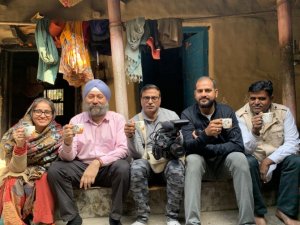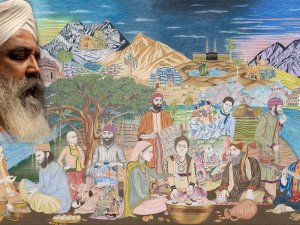Sometimes, we just do not believe or are totally oblivious where our good fortune comes from. And sometimes we pay lip service to Guru Ji or partake in rituals and traditions thinking we are appeasing God and Guru or even chasing away evil spirits.
We have an uncanny ability to steer away from the Truth as Nanak envisaged. The initial truth being that Sikhi is a practical ‘way of life’, not a package of mysterious incomprehensible rites and rituals to pave our way smoothly into the afterlife. That it is a tool for self-elevation in this lifetime.
The main anecdote here is from an autobiography of a Bhai Rama Singh Ji, a highly elevated soul who converted from Hinduism to Sikhi and at one point was the ‘jathedar’ (mukhi?) of the Akhand Kirteni Jatha in UK. (Great book, worth reading. It was translated from Panjabi to English by my older brother Pr. Gurmukh Singh OBE, of UK.)
I was reminded of this story when recently attending (forced to attend by obligation really) a Sikh family celebration of the birth of a beautiful bouncy boy and they were supposedly celebrating some north Indian festival/tradition called ‘Lohdi’.
As a Malaysian-born Sikh I was, in my formative years in Malaysia, totally oblivious of such Hindu-based north Indian traditions amongst Sikhs. I only heard of Lohdi (Lorhi) when I went to UK and saw Indian Hindus and Sikhs celebrating it. It really has no relevance to Sikhi, which means Sikhs.
There were plenty of exquisite dishes of food, awash with alcohol, everyone dressed in their most resplendent clothes, bhangra/Bollywood dancing with a top DJ in session and of course, gifts galore. For some reason there was a wood fire burning in the middle of the courtyard of their palatial home.
Some of the most horrendous fires are burning as I write, in the south-east of Australia and there is smoke in the atmosphere, yet for reasons which even all of them do not know, a wood fire is essential for this festival – something about burning bad luck and evil spirits away. I did crack a joke when given that answer to this ritual that the fires in Australia must have chased away plenty of evil spirits! (Er… did I mention they were Sikhs?) And something about making our Hindu relatives and friends feel welcome. Confounds me really as to how much fellow Sikhs bend over backwards to please others at the expense of their own basic beliefs and practices.
On reflection I wondered why these good Sikh people were not having, or at least, ‘also’ having, a ‘Guru-ka-smagam’ with Ardaas thanking Waheguru for the lovely gift of a beautiful addition to the family.
We sometimes forget as to ‘Who’ showers us with such precious gifts, like a beautiful healthy baby. (Apparently, this tradition is not for baby girls. Girls are not celebrated like this and yet, women encourage such traditions!)
SMAGAM FOR A DOG
But back to the main story. I cannot understand why it came to my mind. I leave that to you and just narrate it.
This story from Bhai Rama Singh Ji’s autobiography does have a ‘smagam of shukrana’ before Guru Ji. Except, that this time, it was for a dog!
I am relating this from memory so I do admit to some creative licence! Bhai Sahib Rama Singh Ji happened to be in a certain western country where he was requested to attend a smagam at a private residence of a Sikh family. They happened to be celebrating the birthday of their pet dog. There was Sukhmani Sahib reading, kirtan, ardaas for the wellbeing of their pet, and after smapti of Guru Granth Sahib Ji there was a birthday cake followed by Guru-ka-Langgar.
Bhai Sahib happened to ask why there was such an elaborate smagam for a pet? The house residents explained that since that dog had come into their lives their fortunes had changed for the better. There was well-being in the family. The family fortunes took an upward turn. The dog had brought them good luck!
(Strange, that in this instance a dog in a Sikh home deserves a Guru-ka-smagam. In the earlier one, the birth of a beautiful Waheguru-gifted Sikh baby boy, deserves an ancient Hindu-based tradition clouded in antiquity!)
Anyway, Bhai Sahib was curious. Guru Ji of course works in strange ways and any excuse to immerse in Naam, but he was intrigued and asked further questions.
The story unfolded. Just before the pet came into their lives, one of the family elders had moved from India to their home permanently. With him came the Guru Granth Sahib Ji. The family made a special room for the parkash of Guru Ji and every day the family elder started doing parkash and smapti and his regular Nitnem. In the evening the family started joining him for Rehras Sahib.
Then, as the family explained, with Guru Ji’s Grace the pet dog came into their lives like a new family member. They named it ‘Lucky’. There was great joy and Lucky was well-loved and looked after especially by the younger members of the family. The family became closer and more loving and there was ‘barkat’ (sense of general well-being and improvement in the finances) in the household. Guru Ji had blessed them with a cute pet dog and truly, they thought, Lucky had brought them good luck!
Since then the ‘elder’ had passed on but the family maintained Baba Ji’s presence though unfortunately, regular family Rehras Sahib fizzled out. The Guru Granth Sahib was reduced to ‘metha-taking’ by all family members.
Bhai Sahib was bemused. He was bemused that no family member had considered that the good fortune was due to the presence of, firstly a saintly elder, and secondly the introduction of Guru Sahib and gurbani into the home and their lives. No, they attributed their good fortune to little Lucky. After all they named it Lucky and it brought them luck!
Sometimes we are oblivious to the powerful presence of Guru Ji and Gurbani within a home especially in good times. The dog got the credit in this instance!
Always remember to attribute all success and well-being and especially ‘Guru-dhiyan-bakhshiyan-datan’ to Guru Ji. That is why we have a greeting … Waheguru Ji Ka Khalsa, WAHEGURU JI KI FATEH.
Waheguru Ji Ki Fateh means that we should attribute all good fortune, achievements, well-being, birth of children, successes and victories to Waheguru. The accolades should always go to Waheguru – ‘shukrana’ and ‘vedeyayi’.
THIS ONE FLOORED ME!
Another footnote: On the subject of parkash and smapti, I just heard something which floored me. I am told that there is a Granthi Sahib in Chandigarh whose sole source of income is to go to the houses of well-off Sikhs to do parkash and smapti for their ‘resident’ Guru Granth Sahib daily. A specialist Parkash/Smapti Granthi! He charges by the day and is apparently making a killing!
So, you can imagine, this Granthi Sahib works feverishly from about 3am to 8am going to individual homes of Sikhs to do their parkash for them and the reverse process is repeated from about 6pm. to perhaps 10pm. ALL EACH FAMILY HAS TO DO IS ‘METHA-TEK’ DAILY.
He has done so well that he has upgraded to a good car from a motor-cycle to carry out his duties.
We know about the outsourcing of Sehaj Path and Akhand Paath, but this takes the cake!
NAIROBI STYLE
Reminds me of a Sikh family in Nairobi which has done one better. They have a full-time paid resident Granthi Sahib all to themselves to look after their Guru Granth Sahib Ji and he always has an ongoing ‘sehaj paath’ and makes himself available if a family member wishes to sit and listen to path anytime during the day.
Every ‘Sangrandh’ the Granthi Sahib makes ‘degh’ and the family gathers for a path-dha-bhog which the Granthi Sahib has completed. Seems like a ‘win-win’! The Granthi Sahib has full employment. Family members get to hear some paath. Guru Ji is in residence. The family claims credit for a dozen sehaj paaths every year. Seems like all bases have been covered. God and Guru must be happy!
Are these not practices that Guru Nanak ridiculed and shunned? I wonder when we are going to start sending water to our ancestors in the sun. But wait, we are already doing that! We celebrate death anniversaries 'Barsies' of loved ones who have passed away and every time the Granthi Sahib does the ardaas after he has done the sehaj path which we have not even listened to and certainly not hearing, he asks Waheguru in Ardaas to “usdhi ruh nu charni nivas bakhshena” … again and again! There must be thousands of unhappy Sikh spirits out there which have not move on!!!
Happy Sikhing.






